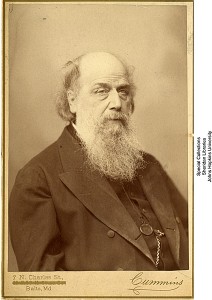
When James Joseph Sylvester came to The Johns Hopkins University in 1876, he was the most senior of the original faculty, in terms of age and prior accomplishments. The university’s first professor of mathematics, Sylvester had already had a full career in both academia and business. Alternately brilliant and erratic, warm and irascible, benevolent and egocentric, Sylvester helped propel the infant university to the forefront of scholarly attention soon after his arrival in Baltimore.
Born in 1814 to the family of a Jewish merchant in London, Sylvester showed mathematical talent at an early age. Barred from most universities because of his religion, he entered the University of London at the age of 14. Because he could not subscribe to the beliefs of the Church of England, Sylvester was denied his degree, though he later earned bachelor’s and master’s degrees from Trinity College, Dublin.
In 1841, Sylvester assumed the chair of mathematics at the University of Virginia. If he expected Virginia to resemble the dignified atmosphere of British universities, he soon realized how wrong he was. Although warmly received in Charlottesville, he discovered that students did not regard their instructors with quite the same reverence as did their European counterparts. Known for their “drunkenness and lawlessness,” the student body included one who had murdered a faculty member just prior to Sylvester’s arrival. After less than a year, Sylvester resigned, protesting the mild punishment given to a student who had been threatening and insubordinate to him.
Despairing of prospects in the United States, Sylvester returned to England in 1843. He found an actuarial position with a London life insurance company and eventually took a position at the Royal Military Academy in Woolwich, where he spent the next 15 years studying the theory of invariants, partition theory, and polynomial equations. Forced into retirement in 1870, Sylvester seemed at the end of a creditable career.
In 1875, as Daniel Coit Gilman traveled Europe searching for faculty, colleagues recommended Sylvester for the chair in mathematics. Determined to find the right people even if it meant postponing instruction in a particular field, Gilman took his time evaluating the older man. He wondered whether Sylvester, already 61, would have the energy to build a department and train people to follow in his steps. Colleagues assured Gilman that the mathematician desired a fresh start, and was up to the task, and Sylvester quickly warmed to the prospect as well.
In May 1876, Sylvester arrived in Baltimore and began setting up his curriculum. With keen insight, he chose for junior faculty positions (and graduate students) individuals who went on to distinguished careers. Although Sylvester spent only seven years at Hopkins before returning to England and semi-retirement, his effect on the university was dramatic. He founded the American Journal of Mathematics in 1877, conducted and directed extensive research in higher mathematics, and championed the admission of a brilliant female graduate student, Christine Ladd. Thanks to his efforts, mathematics was set on a firm foundation from our earliest years.
Sylvester was absent-minded and could focus on a problem so completely as to be oblivious to all surroundings. He was also known for stopping in mid-lecture when a new (and irrelevant) idea struck him, and pursuing that tangent to the bewilderment of his students.
In declining health in his later years, but still working on a paper in February 1897, Sylvester suffered a stroke, which led to his death on March 15. “No ‘mere calculating-machine,’ Sylvester had many interests besides mathematics – poetry, literature, music, chemistry, elocution, travel … he was eccentric, passionate, unafraid to stand up for the principles he believed in. He could also be humorous, annoying [and] testy.” (Karen Parshall, James Joseph Sylvester: Life and Work in Letters, Oxford University Press, 1998, p. xii.)
